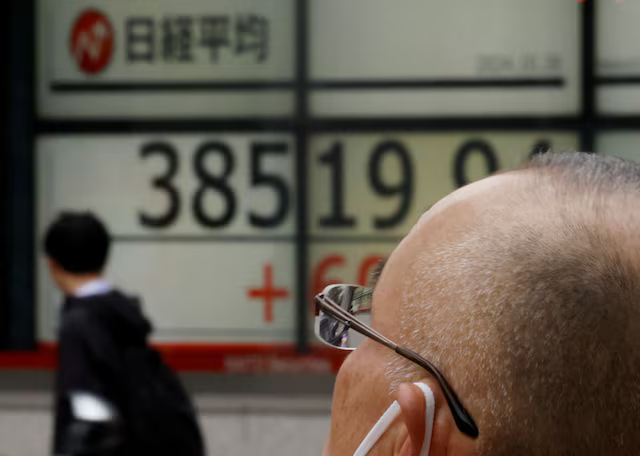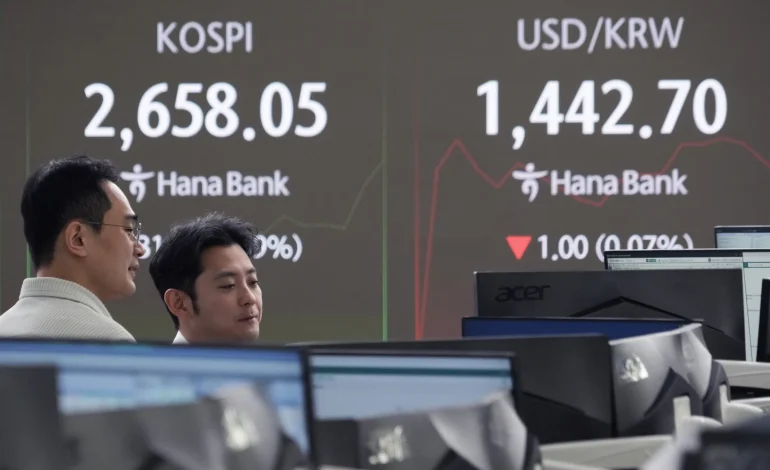Asian markets fell on Thursday as investors reacted to US President Donald Trump’s proposed tariffs on auto, semiconductor, and pharmaceutical imports, along with concerns that the Federal Reserve may keep interest rates elevated for a longer period.
Japan’s benchmark Nikkei 225 and the broader Topix index ended in negative territory for the second consecutive session. The Nikkei 225 dropped 1.24% to 38,678.04, while the Topix fell 1.18% to 2,734.60. The Japanese yen strengthened to a more than two-month high of 150.52 per U.S. dollar, as expectations for further rate hikes by the Bank of Japan supported the currency.
South Korea’s Kospi declined 0.65% to 2,654.06, and the small-cap Kosdaq lost 1.28% to 768.27.
In China, the CSI 300 edged down 0.29% to 3,928.90, while Hong Kong’s Hang Seng Index slipped 1.60% to 22,576.98.
Australia’s S&P/ASX 200 extended its losing streak for the fourth straight session, closing 1.15% lower at 8,322.80. The decline came as the country’s unemployment rate rose to 4.1% in January, aligning with analysts’ expectations.
India’s Nifty 50 was down 0.15%, while the BSE Sensex declined 0.31% as of the afternoon session.
Trump’s tariff proposals weighed on the automotive sector, with Japanese and South Korean car manufacturers seeing declines. Nissan led the losses, falling 3.45%, followed by Mazda (-1.89%), Toyota (-1.83%), Honda (-1.59%), and Mitsubishi Motors (-1.37%). In South Korea, Hyundai Motor and Kia Corp also declined, losing 0.98% and 0.84%, respectively.
In China, food delivery stocks Meituan and JD.com dropped 6.92% and 2.2%, respectively, following announcements that both companies plan to provide social security benefits for workers.
Despite trade concerns, US stocks continued their upward momentum overnight, with the S&P 500 reaching a new record close, rising 0.24% to 6,144.15. The Nasdaq Composite added 0.07%, while the Dow Jones Industrial Average climbed 0.16%.
Minutes from the Federal Reserve’s latest meeting revealed concerns about the potential inflationary impact of Trump’s tariffs. Policymakers signaled that they would prefer more evidence of declining inflation before considering rate cuts, reinforcing expectations that interest rates could remain high in the near term.
The Japanese yen continued to strengthen, gaining 0.9% against the US dollar to 150.065 per dollar. The dollar index, which measures the greenback against a basket of major currencies, eased 0.16% to 107.06.
Gold prices hit a fresh record high of $2,947.11 per ounce, reflecting increased demand for safe-haven assets amid economic uncertainty.
Oil prices edged lower, with US crude falling $0.31 to $71.94 per barrel, and Brent crude down $0.21 to $75.83 per barrel.
Analysts suggest that uncertainty surrounding US trade policies and Federal Reserve actions could continue to drive volatility in global markets. While some investors see Trump’s tariff threats as a negotiation strategy, others remain cautious about the potential for broader trade tensions that could impact global supply chains.
“Investors must come to terms with the fact that volatility will be more elevated this year,” said Vasu Menon, managing director of investment strategy at OCBC Bank. “There are valid reasons to remain optimistic, but a measured approach is essential in the current market environment.”
With input from CNBC, Reuters, the Associated Press.








